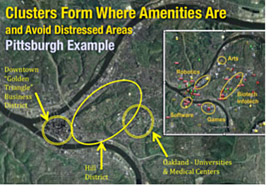Feature Article: Regional Innovation Clusters and Economic Revitalization
By Dr. Christina Gabriel, President, University Energy Partnership and Member of the National Advisory Council on Innovation and Entrepreneurship & Bomani M. Howze, MBA, Vice President, University Energy Partnership
Innovation-driven industry clusters are powerful engines for job creation and sustainable economic growth. Yet even in regions with strong clusters, a rising tide does not automatically lift all boats. Small geographic pockets can become more affluent and more crowded while even in nearby neighborhoods high rates of unemployment and poverty can persist.
How can the economic engines of innovation clusters instead offer bridges to opportunity and help revitalize distressed communities?
Certainly there is no silver bullet to eliminate longstanding economic disparities and break the cycle of intergenerational poverty. But even highly specialized technology clusters can offer a broad range of opportunities for employment and entrepreneurial business growth throughout a local supply chain. With collaborative planning, investments in technology-based economic development can be accompanied by parallel investments in community-based programs targeted to support the needs of the individuals and businesses seeking opportunities made possible by the region's growing clusters.

Pittsburgh's Hill District, home of playwright August Wilson, was once a community rich with demographic diversity and cultural life, including especially the places that bred its strong jazz tradition. Today it is a predominantly African American community still struggling to recover economically from the federally subsidized "Urban Renewal" bulldozing that displaced 8000 residents fifty years ago and severed their social and business networks.
Located on high ground with spectacular views and sandwiched between the region's downtown business district and the campuses of its major research universities, the Hill District has continued to experience high rates of poverty, unemployment and crime even though technology-based clusters of new, high-growth firms are aggregating in the adjacent neighborhoods.
Five years ago a state-supported program created an "innovation zone" centered in the Hill District with incentives to attract technology-based firms. Philanthropic foundations, universities and nonprofits have been collaborating to design and fund a series of mutually supporting interventions to complement this state seed funding.
Programs include microfinancing for African American and African immigrant entrepreneurs with connections to suppliers on the African continent and diaspora; a cooperative of women entrepreneurs who do business according to the African principle of Ujamaa; a university pharmacy that serves the community while training students; entrepreneurship training for ex-offenders; and the restoration of the Hill District's iconic historical sites to become new social, cultural and business venues.
A former public school building is being renovated as an energy-sector innovation center, including a workforce training program for green building operating engineers, a business incubator, a university laboratory, and a corporate showcase.
Progress has been fragile but significant. Coordination among nonprofits, educational institutions, individual investors, and philanthropic foundations has kept projects moving forward in the face of the economic downturn and the loss of state funding. The number of technology-based companies is increasing steadily and the pace of private-sector development is picking up. Ground was broken last year for the community's first grocery store in decades.
In time, Pittsburgh's celebrated transformation from a one-industry steel town to a diverse, "most livable city" may become the story of the Hill District community as well.
Dr. Christina Gabriel is president of the University Energy Partnership, a collaboration co-founded in 2010 by Carnegie Mellon University, the University of Pittsburgh, Penn State University, Virginia Tech, and West Virginia University to focus on energy technology research and regional innovation cluster growth. Previously she directed Innovation Economy grant making at The Heinz Endowments in Pittsburgh, PA, and prior to that she was vice provost and chief technology officer at Carnegie Mellon University. Dr. Gabriel is a member of the National Advisory Council on Innovation and Entrepreneurship.
Bomani Howze is vice president of the University Energy Partnership and also was formerly with the Heinz Endowments Innovation Economy program. He has been a nonprofit executive, an entrepreneur and a public-school teacher and was appointed by Governor Ed Rendell to serve on the Pennsylvania Minority Business Development Authority.


